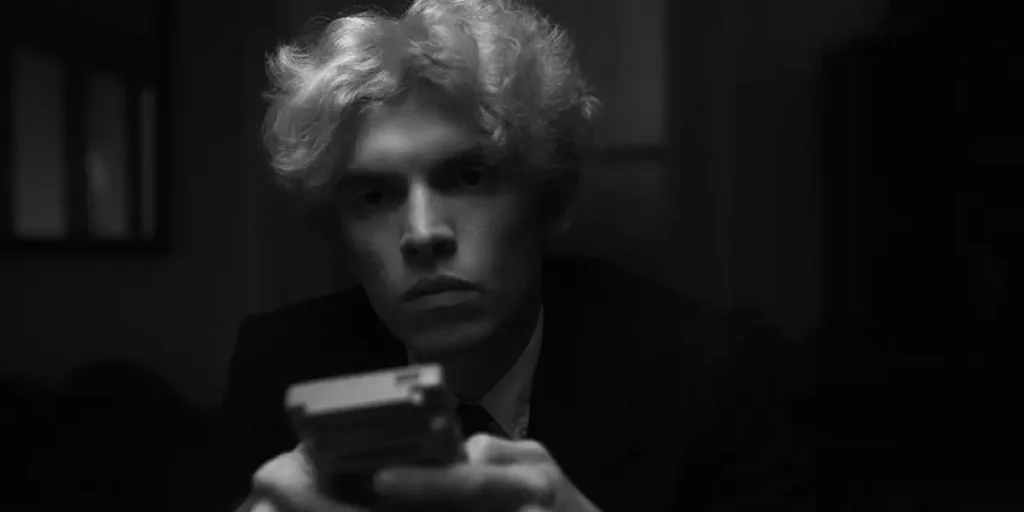Mark H. Rapaport and Kimball Farley’s Hippo has got to be one of the wackiest tellings of adolescence, blended with a satirical confrontation with patriarchy.
Director: Mark H. Rapaport
Genre: Comedy, Drama
Run Time: 100′
U.S. Release: November 8, 2024 (limited)
U.K. Release: TBA
Where to Watch: in select US theaters
With the rise of European filmmakers such as Yorgos Lanthimos (Kinds of Kindness, Dogtooth) and Kristoffer Borgli (Dream Scenario, Sick of Myself) finding their way to the mainstream side of Hollywood cinema, a certain eccentricity to filmmaking is being encouraged and popularized in recent years. Hippo is a film that simultaneously feels like it takes direct inspiration from this modern movement of absurdist tragicomedies and also somehow transgresses it with an underivable flair of individuality that locks you in its paradox.
Hippo examines the strange suburban life of two step-siblings – the video-game-addicted brother Hippo (Kimball Farkley) and the adopted Hungarian sister Buttercup (Lilla Kizlinger) – both struggling to understand the world and to make sense of what their roles are in it. They have a hard time grasping the logistics of sexuality, as living in isolation has not given them much space to explore urges of this nature aside from on the internet and with each other. With Hippo, writer-director Mark H. Rapaport and lead actor and co-writer Kimball Farley conceive an oddball of a feature debut that is, in equal measure, off-putting and confusingly alluring in its storytelling.
Both Hippo and Buttercup have crafted their interests, beliefs, and identities based on information exclusively from questionable sources, including their mother Ethel (Eliza Roberts). The characters’ train of thought is oftentimes delightfully narrated by Eric Roberts (The Dark Knight), whose eloquence and expressive timbre gives the audience glimpses into the peculiar inner workings of Hippo and Buttercup’s brains when left to their own devices. Sheltered from any real-life experience, how do they perceive their world?
What does Hippo make of society when the only things he embraces are violent games and war? What does Buttercup – a girl who’s been taught the rules of Christianity and her maternal instinct – make of it when the only man available to her is the not-blood-related chaos-worshiping incel? Almost every interaction between the two is uncomfortable to sit through, but the writing carries itself with an offbeat sense of humor that stays intriguing even when discussing some utterly perverse subject matter.

The unusual nature of the family dynamics allows for an exploration of various taboos in a way that’s extremely detached from the stigma that they would otherwise be surrounded by anywhere beyond the walls of Hippo and Buttercup’s household. The characters are almost unaware of their brush-ups with topics such as pedophilia, incest, and domestic abuse. However, there is one thing that Hippo blatantly satirizes: the absurdity of the patriarchy.
“I am omnipotent. I am the destroyer of worlds. I am the ultimate life form,” says Hippo to his reflection at a point in the film, when he has completely embraced his manhood and his role as the protector of the family. His twisted ideas of what that entails drive his every action. He protects his sister from an alien invasion with his crossbow and his Super Soaker. His “Godfinger” is the one true source of his power.
Traditional gender roles exist here – only, they are shaped by the genre to look radically different. The film challenges the concepts of the patriarchy by portraying them within these ridiculous and overexaggerated parameters, letting the satirization of patriarchal beliefs seep into every wallpaper, every performance, and every facet of the narrative in general. Hippo takes control over the story right from its title—the film tells the tale of Hippo and Buttercup, but you don’t see the film being called Hippo & Buttercup. The patriarchy would agree it must be named after the masculine dominant figure, right?
On the other hand, Buttercup’s coming of age arrives with her aching desire to bear a child. Her longing for offspring pushes her to desperate measures in order to fulfill the duty she feels she’s been destined for. So, in turn, her strength lies in her womanhood.
Hippo is a film that grows more and more bizarre by the minute, successfully carrying out an outlandish aesthetic that can’t help but be seen as a love child between Wes Anderson-esque cinematography and narration and early-years Yorgos Lanthimos-style offbeat performances and deadpan wit. Yet, Mark H. Rapaport shapes this eccentric amalgamation in a way that preserves his own directorial signature and a certain absorbing authenticity, which makes this uncomfortable watch quite the entertaining experience.
Hippo will be available to watch in select US theaters on November 8, 2024.

